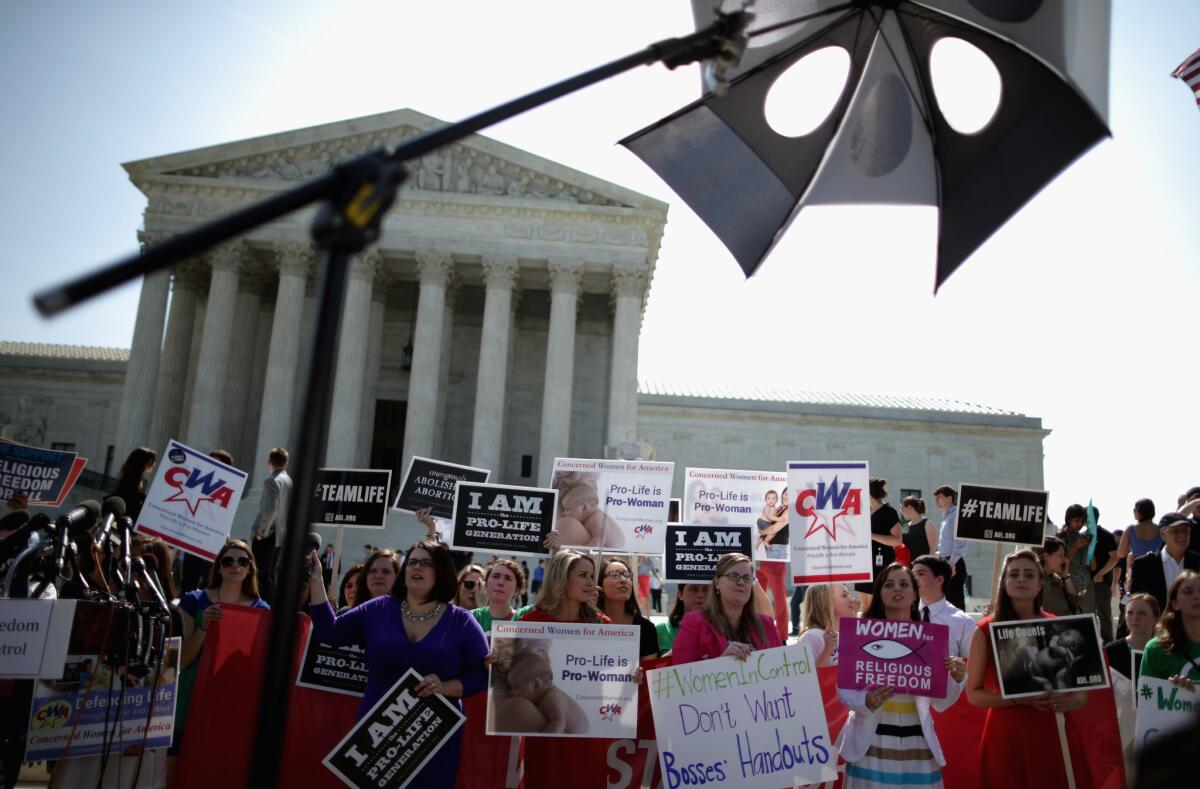The craziest thing about the Supreme Court’s Hobby Lobby decision

- Share via
What stood out as the worst aspect of Monday’s Supreme Court decision on the lawsuit brought by Hobby Lobby against the Affordable Care Act’s contraceptive mandate?
For advocates of reproductive rights, it’s that the highest court in the land embraced the idea that “business owners can use their religious beliefs to deny an employee a benefit guaranteed by law,” as the ACLU’s Deputy Legal Director Louise Melling put it.
That’s pretty bad. But something else is troublesome about the case, at least to me. And that is the idea that the justices simply accepted without question the claim by the Greens, a Christian family who own the Hobby Lobby chain of craft stores, that the four types of birth control they refuse to cover -- two kinds of IUDs and two morning-after pills -- cause abortion.
They do not.
“Today’s decision is based on the Court accepting as the owners’ sincere religious belief that these drugs and devices can destroy an embryo and end a human life,” said Ovide Lamontagne, general counsel of Americans United for Life, a leading anti-abortion group that supported Hobby Lobby’s assertion that the Affordable Care Act’s contraception mandate violated the Religious Freedom Restoration Act.
Lamontagne quoted favorably from the court’s 5-4 majority opinion, written by Justice Samuel Alito: “The owners of the businesses have religious objections to abortion, and according to their religious beliefs the four contraceptive methods at issue are abortifacients. If the owners comply with the [Obama administration’s contraception] mandate, they believe they will be facilitating abortions...”
The problem here is that their religious belief is not a scientific truth. Just because the Greens believe that emergency contraception and intrauterine devices induce abortion does not make it so.
In fact, medical experts say quite the opposite.
The American College of Obstetricians and Gynecologists filed a friend-of-the-court brief supporting the contraceptive mandate. On its website, here is how ACOG replies to a question about whether emergency contraception like Plan B and Ella, the “morning-after” pills to which Hobby Lobby so strenuously objects, can cause an abortion:
“Emergency contraception will not disrupt an established pregnancy. Women often are exposed to exogenous hormones in early pregnancy without adverse outcome. Some women undergoing assisted reproductive technology procedures to achieve pregnancy are routinely prescribed progesterone to support the pregnancy. It is also a common occurrence to interview patients in early pregnancy who were not aware that their missed pills had resulted in contraceptive failure and who thus had continued taking their pills.”
As for whether IUDs cause abortion, here is the opening paragraph of a 1989 Population Council publication, IUDs are Contraceptives, not Abortifacients, by Irving Sivin, a senior associate in the council’s Center for Biomedical Research:
“Prevalent social myth holds that IUDs are abortifacients. Even U.S. Supreme Court Justice John Paul Stevens, in dissent from the majority opinion in Webster v Reproductive Health Services, subscribed to this belief. Scientists, including developers of IUDs, have believed it. The key element underlying this myth is that IUDs act only at the uterine level, either to prevent implantation or to destroy developing embryos in the uterus before implantation. Today, however, the weight of scientific evidence indicates that IUDs act as contraceptives. They prevent fertilization, diminishing the number of sperm that reach the oviduct and incapacitating them.”
So why would the Supreme Court blindly accept the assertion by the Greens and their fellow plaintiffs that these contraceptive methods cause abortion?
Because all that matters, in this religious freedom case, is that the Greens believe it.
“When the court looks at religion claims,” said Melling, “one of the elements raised is the sincerity of the religious belief. And the court is usually quite deferential to what somebody says is their belief. In that respect, it’s less unusual than people might think that the court didn’t look behind that assertion.”
Thousands of women could be denied employer coverage for perfectly legal contraception because of a mistaken belief by their religiously conservative bosses about how birth control actually works. Unbelievable, but true.
What else is crazy? Follow me on Twitter to find out: @robinabcarian
More to Read
Sign up for Essential California
The most important California stories and recommendations in your inbox every morning.
You may occasionally receive promotional content from the Los Angeles Times.














